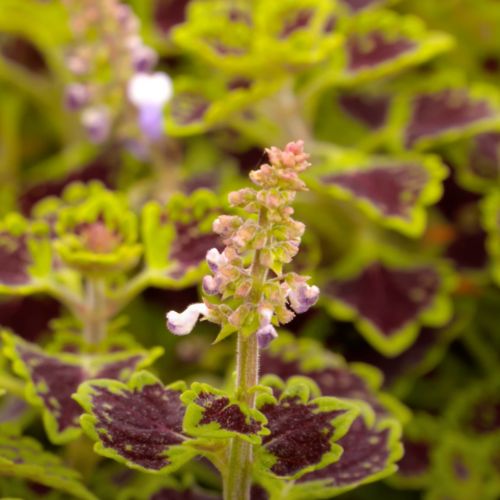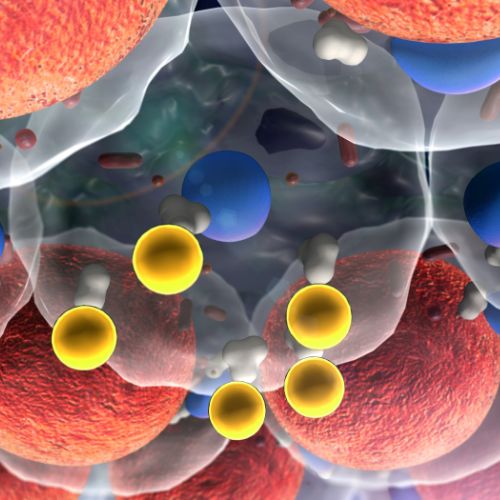When we’re researching the cutting edge of supplements, it can be easy to forget that all medicine started as herbal medicine. So when we encounter an Ayurvedic plant or compound that’s being used for things like Low-T, we shouldn’t dismiss it out of hand; not every good thing comes out of a synthetic lab, and most of the best T-Boosters are herbal.
But that also doesn’t mean that every herb works as advertised. We’ve covered quite a few sham supplements, here at the Great Green Wall. So when we try to answer the questions on Forskolin, we have to look at the science, not the hype. Let’s dive in.
What You Need to Know
What is Forskolin, Exactly?
Before we jump into the chemistry, let's briefly touch on some botany. The compound called Forskolin is named for a mistake in early Taxonomy (the science of naming plants and animals).
Forskolin comes from the plant Coleus barbatus, also called Plectranthus barbatus (“barbatus” means barbed, or “having spurs”). In earlier times, a botanist had thought it was related to plants identified by a man named Pehr Forsskål. So even though the plant name for Coleus has changed, the compound from it, Forskolin, has stuck.

Chemical Breakdown
Now to the hard science. Most, if not all, of the uses for Forskolin derive from its ability to activate our Adenylyl Cyclase process, also referred to by its primary component, cAMP (Cyclic adenosine monophosphate). cAMP is responsible for sending messages between cells about hormones, immune response, metabolism, and much more.
In essence, Forskolin’s diterpenes (natural Carbon-Hydrogen compounds) can raise our level of cAMP activity. This means faster messaging between cells, and even transmitting hormones across cell barriers they otherwise can’t cross.
Primary Scientific Evidence
Okay, that sounds straightforward. But we have to remember that the human body is full of riddles and seeming contradictions. For instance, our heart needs Potassium to function; but too much Potassium can cause heart failure. So just because Forskolin increases cAMP activity, and cAMP activity can help with hormone signaling, doesn’t mean it will automatically raise your Testosterone.
Which is why several teams of scientists around the globe have tried to isolate the exact effect Forskolin can have. To date, there has only been one human study of its Testosterone action, but results are promising.

Live Trial
A number of studies have tried to measure if Forskolin’s cellular effect can impact whole body changes. Weight loss, muscle performance, even asthma attacks have all been addressed by Forskolin, with varying success. One such study, measuring weight loss in overweight men, actually found an increase in Testosterone, as well.
To date, this is the only live study of humans regarding Forskolin and Testosterone, but its results are strong and straightforward–Forskolin raised T-Levels across the board. This first study indicates that there may be a secondary effect taking place; that is, we all know that exercise and weight loss can increase Testosterone. So is that all that’s happening? Or is there more?
In the Lab
Trying to find out if there is a cellular reason for increased T can be tricky. After all, it’s not always possible to ask dozens of men to submit to Leydig cell sampling. Sometimes it’s not possible to ask one man to submit to that.
That’s one of the many reasons we have animal studies. In one such lab study, researchers isolated the Leydig cells (the parts of testes that produce Testosterone) from rats, and injected the active compounds from Forskolin into them. And the results were conclusive–Forskolin directly led to more Leydig expression and T-Production.
This effect has been so profound and widely accepted that Forskolin is used as a control in other studies. As an example, when studying the toxic effects of chemicals on Leydig cells and T-Production, scientists used Forskolin as the “here’s what happens in a great environment” example. (If you’re curious, they used Prochloraz as the “here’s the worst-case scenario for Leydig cells,” so stay away from that stuff.)
All of which indicates that, at least on isolated cells, Forskolin does indeed have the primary effect of boosting T-Production. Which then begs the question, why isn’t it everywhere?

Where’s all the Forskolin?
It’s easy enough to find Forskolin as a stand-alone T-Boosting supplement, but why don’t we see it included in industry-leading formulas? Part of the issue could be safety. In one very recent report, Forskolin showed substantial toxicity for pregnant women and even their offspring. Not a big deal for men, but some supplement manufacturers steer clear of anything that has red flags.
That being said, a massive medical survey that included almost 1,500 Forskolin users found no serious side effects. That said, 8.5% of all Forskolin users had diarrhea, and a quarter of those people said it was so bad they had to stop taking it. That alone could explain why all the best T-Boosters stick with herbs and other proven ingredients that don’t have any side effects.
Final Word
Some things come with a cost. Medications that save lives can have debilitating adverse effects. But in the world of T-Boosters, there’s probably no reason to suffer from constant intestinal pain and diarrhea from Forskolin when there are literally dozens of other proven, safe, and effective ingredients and herbs.
So while all the evidence points to Forskolin being immutably effective at increasing Testosterone production, it may not be worth it for everyone. Like with many things in the health and wellness sphere, weigh your options, consult your physician, and make the best choice for you, your goals, and your wellbeing.

 Français
Français Deutsch
Deutsch